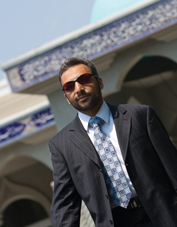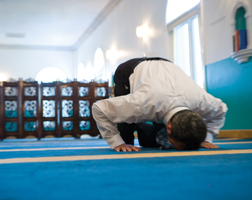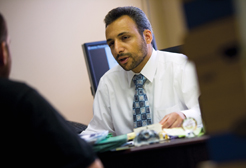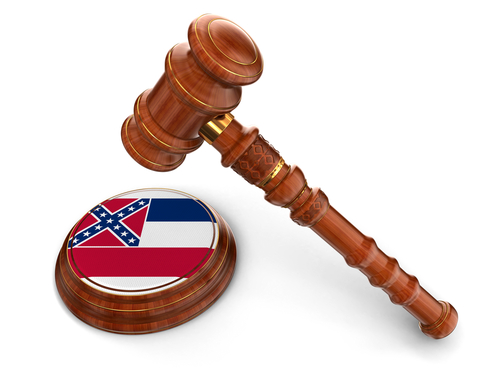The Go-To Lawyer of 'Northern Virginiastan'

Ashraf Nubani had a plan when he left the bustle of New York City in 1998, relocating with his wife and four children to the gentler northern Virginia suburbs of Washington, D.C. He took a job with a 10-lawyer firm and began developing a specialty in one of its practice areas—immigration.
His ever-expanding ties to the metro area’s large Muslim community would help grow a general practice in a way he describes only half-jokingly:
Step 1: Help the foreign national get an H-1B visa, which is quicker than a green card for permission to work here.
Step 2:When he becomes a permanent resident, handle incorporation matters for his startup company.
Step 3: After he marries, represent him in his divorce.
Step 4: When his ex-wife takes all the money, work his bankruptcy.
Step 5: When his resulting anger leads to a DUI arrest, go with him to traffic court.
That was the plan. But things changed considerably for this Palestinian-American lawyer after Sept. 11, 2001.
Many have been overtaken by events since that fateful date. Nubani, 40, was overtaken by a reawakened sense of political and community beliefs and obligations that had fed his first few years of law practice, before he sought the sleepy suburban routine.
As a student at the criminal law clinic of the Indiana University School of Law-Bloomington, Nubani was part of a team challenging prison conditions for an inmate at the Federal Correctional Institution in Terre Haute—one of the 1993 World Trade Center bombers.
He was a third-year summer intern with late and legendary William Kunstler and still-in-everyone’s-face Ronald Kuby in New York City. They represented three defendants in that bombing.
Out of law school, he returned to New York City to work for a year with the storied, iconoclastic lawyer Stanley Cohen, who has almost as many hate Web sites against him as he does clients. Cohen has represented the Palestinian Authority and Hamas as well as many other unpopular clients. Nubani helped him throughout 1995 in the matter of Mousa Abu Marzook, leader of the political wing of Hamas, who was fighting extradition to Israel.
Then there was a year with Michael Kennedy, another prominent New York City criminal defense lawyer, whose clients have included Susan McDougal of Whitewater notoriety and Bill Johnston, the federal prosecutor who was investigated for his handling of the case against the Waco, Texas, Branch Davidians.
THE GO-TO GUY
Nubani’s immigration practice has taken him directly into the realm of terrorism and the law. He has become the go-to lawyer for many Muslims in northern Virginia and throughout the U.S.—citizens and immigrants alike—who have been caught up in terrorism investigations and law enforcement’s “prevention paradigm.” The numbers and kinds of terrorism investigations and criminal cases in Nubani’s own backyard have led critics to dub the region “Northern Virginiastan.”
Mostly through the local mosque, Nubani knew some of the men prosecutors called the “paintball terrorists,” part of a suspected jihad network in Virginia. Nubani withdrew from direct representation of one when prosecutors argued there was a conflict of interest because he advised some of them while they were under FBI surveillance. (Nine of the men were later convicted of using paintball games as training for various holy wars in support of Islam.)
“Ashraf has been very visible in many of the northern Virginia cases,” says Jonathan Turley, who teaches at nearby George Washington University’s law school and is handling the appeals of two high-profile Muslims convicted of terrorism-related charges, Sami Amin al-Arian and Ali al-Timimi. “He has either been involved directly in many cases or played a significant role in getting lawyers and resources for these defendants.”
As part of his prevention paradigm, then-Attorney General John Ashcroft made immigration law a major tool for fighting terrorism inside the U.S. Suspected “sleepers”—terrorists living here peaceably until it is time to strike—have been kicked out of the country for the slightest mistaken jot or tittle on immigration paperwork. This has been a bane of troublemakers and law-abiding immigrants alike, as well as a boon to immigration and criminal defense lawyers.
Indeed, the U.S. Justice Department’s inspector general issued a report (PDF) in 2003 criticizing post-9/11 immigration enforcement sweeps. Among other problems, the report noted that in New York the FBI made little effort to distinguish between resident aliens investigated for terrorism and those with no terror connection, but whose names came up coincidentally with other leads.
“People I’ve defended or come across in these sweeps are examples of why the system is not working, not how it is working,” Nubani says. “No one can predict or stop the next attack, and to embark on a policy that assumes you can is faulty in its inception. That leads to the taking away of rights.”
One of Nubani’s clients was charged criminally for checking a box for “single” rather than “divorced” on immigration papers. Another client, a butcher, sold skewers and dish detergent to an undercover agent who made the purchases with food stamps, which must be used only for food.
But he also represented Ahmed Abu Ali, who is now serving 30 years for providing material support to al-Qaida’s terrorist network and plotting to assassinate President Bush.
As might be expected, his certitude about unfairness in some of these cases is not shared by all.
The prevention paradigm by nature creates a tension and will have some false positives, says Robert Chesney, a national security law expert at Wake Forest University School of Law in Winston-Salem, N.C. “One cost of intervening early is that if you do it successfully, the people you’re prosecuting haven’t gotten to the point where it looks more serious.”
Chesney points to the recent car bombing attempt in London, allegedly by a group of Arab physicians-turned-terrorists. The bomb fizzled and smoked in a busy nightlife district at the late hour, but it failed to detonate.
“No one is claiming that they weren’t going to do anything. Obviously they were, but, boy, was that cutting it close,” says Chesney. “Stopping it earlier would have been a good thing, but then you’re open to the question of whether these guys really were going to do anything.”
As far as preventive enforcement is concerned, Nubani is driven by a mix of the personal and professional.
“There may be people who view me as a ‘fifth-column type’ by virtue of what I do,” he says. “I haven’t shied away from any cases, but I view myself as doing what needs to be done under the circumstances.
“I’m too close to my community not to do my fair share as far as protecting their rights, and in the end it’s protecting the rights of everyone.”
MAN OF FAITH

Nubani takes time out for prayer
at Dar al-Hijrah mosque.
Nubani’s mentor, radical lawyer Cohen, who still occasionally works on matters with Nubani, has this to say: “Ashraf is a very principled guy and he doesn’t get intimidated by the moment. The most significant thing about him is obviously his faith, and faith and the practice of law are sometimes like distant cousins not on speaking terms.
“In some ways it has been difficult for him over the years, as he has nuanced his way through the practice of law shaded by his overwhelming commitment to this strongest force in his life—his belief.”
Hearing that, Nubani says he has changed since he worked for Cohen: “I’m better now at reconciling ideals with reality, such as when I see that a judge is prejudiced. I’m better at playing the way of the system.”
Nubani’s devout nature is evidenced by his being occasionally called upon to fill in for one of the imams at the Dar al-Hijrah mosque in Falls Church and deliver the sermon at Friday prayer sessions.
He was scheduled to do so one recent Friday, but the imam ended up not leaving town. Nubani’s planned sermon: According to the Quran and the traditions of the prophet Muhammad, Muslims must accept or implement justice no matter what it means to them personally, even if applied to self or family.
“I was going to make the point that Muslims can’t be viewed by others as selectively implementing justice when it suits us,” Nubani says. His sermon would have been double-edged, implying also that Muslims now suffer from selective justice.
This particular mosque has been criticized by some as supporting an extremist version of Islam that encourages terrorism. Two of the 9/11 hijackers had worshipped there briefly. Others have found the imams speaking there have been moderate in recent years.
On the Friday Nubani was to speak, the noon prayer session was led by Sheik Muhammad al-Hanooti, the mosque’s leader in the late 1990s.
In the early ’90s, al-Hanooti was head of the Jersey City, N.J., mosque where Omar Abdel Rahman, the “blind sheik,” made fiery speeches heard by men involved in the 1993 World Trade Center bombing. Abdel Rahman is serving a life sentence for plotting to bomb various landmarks around New York City. The FBI spoke with al-Hanooti in its investigation, but he has not been implicated in any terrorist activities.
At the prayer session, al-Hanooti’s sermon included an admonition against overreacting to criticisms of Islam and the prophet Muhammad that have been rampant recently. One good result of the insults, he says, is that hundreds of thousands of people around the world have been asking questions about Islam and trying to learn about it, prompting some even to convert or revert to the religion.
Later, Nubani expressed sadness that “the pop culture view of Islam is that it’s a cutthroat, kill-people kind of religion.” That makes it all the more acceptable for any and all Muslims to be dismissed as terrorism-related, even in a six-degrees-of-Kevin-Bacon way of connecting dots.
Nubani’s low-key, soft-spoken manner belies his passion and determination. He has overcome any number of obstacles since his family moved from Kuwait to Chicago in 1970, when he was 4.
His difficulties with vision are noticeable almost immediately as he pulls a cell phone near the tip of his nose to read the numbers. He has been legally blind all his life and, because of sensitivity to light, wears dark-tinted glasses even indoors. To his detriment, that can look sinister in a courtroom.
He sees well enough to read and navigate crowds and buildings, as well as give directions on roadways, though he can’t drive. As a kid he occasionally crashed his bike because of his poor sight. His father was a foreman in the now-closed Schwinn factory in Chicago, and Nubani and his brothers always rode the latest models.
POLITICAL AWAKENING

He confers with a client at the
Annandale, Va., offices
he shares with
Hassan Ahmad, an American
of Pakistani descent.
Even now Nubani retains a semi-religious extremism gained while growing up in the Belmont-Cragin area of the city—he’s a Cubs fan. His accent is regionally indistinguishable American.
He says his political awakening came when he was a sophomore at Schurz High School and some relatives from the Sultanate of Oman visited in the summer of 1982. Israel invaded Lebanon that summer, and for the first time Nubani became interested in world affairs in general and the Middle East in particular. He and a visiting cousin had T-shirts made with political messages. Nubani’s read “PLO” in huge letters on the back and “Long Live Palestine” on the front.
When he wore it to school, he says, a Jewish teacher complained and the principal threatened suspension if he wore it again. Another teacher suggested privately that Nubani contact the American Civil Liberties Union. The group intervened with a letter to the school board’s lawyers, and Nubani was permitted to wear the shirt to school, which he did every day till he wore it out.
Before law school, he got a master’s degree in history from the University of Wisconsin. His thesis dealt with the history of Muslims in the U.S., particularly their institutions, schools, and political and social issues.
That, says Cohen, proved to be significant in the 1995 Palestinian extradition case with which Nubani helped. Cohen had worked with Muslim clients from Kosovo and Albania in the past, “but [Nubani] facilitated understanding and entry into the bigger community that was invaluable to me in that case and has been for many years since.”
Nubani’s knowledge of the Muslim-American community developed in part from his involvement in various meetings and conventions around the country over a number of years. That is how he came to be friends with the now-notorious former Palestinian activist and Florida computer science professor Sami Amin al-Arian.
Though he has not represented al-Arian, Nubani is close to him and his family and has assisted them in other matters, including fundraising.
In 2003, al-Arian was indicted on multiple charges that he was a leader in the Palestinian Islamic Jihad and handled fundraising for the group. A Tampa jury acquitted al-Arian on eight of 17 charges and hung on the others. It was seen as an embarrassment for the U.S. Department of Justice.
But ultimately, al-Arian entered a plea agreement to a single charge of conspiracy to provide services to the PIJ and agreed to be deported. Since then, the government has twice brought al-Arian before grand juries, and he remains jailed for contempt because of his refusal to testify.
Dean Boyd, spokesman for the DOJ’s National Security Division, says that rather than address complaints about unfairness to al-Arian, he prefers providing the judge’s comments from al-Arian’s sentencing.
U.S. District Judge James S. Moody Jr. highlighted a letter al-Arian had written to a Kuwaiti legislator. The letter sought funding from Kuwait for the Palestinian Islamic Jihad and mentioned their success with a 1995 double-suicide bombing at a bus depot in Israel.
The FBI was unable to prove the letter had actually been sent, and the legislator says it was never received. Lawyers for al-Arian argued that an undelivered letter amounted to no more than al-Arian’s private thoughts.
Moody seized on that when addressing al-Arian:
“You continue to lie to your friends and supporters, claiming to abhor violence and to seek only aid for widows and orphans. Your only connection to widows and orphans is that you create them, even among the Palestinians; and you create them, not by sending your chil- dren to blow themselves out of existence. No. You exhort others to send their children.”
The judge ignored the prosecution’s recommended sentence and gave al-Arian the maximum 57 months, including time served. That leaves him 19 months to serve when (or if) he is no longer jailed for contempt.
Al-Arian’s plight devastated his family and friends, including Nubani, who believes the judge wrongly relied on acts for which al-Arian was acquitted. Nubani wrote a poem, titled “The Good Professor, Dr. Sami al-Arian.” In one stanza, it echoes the political speech defense:
“Death to Israel,” said to be his downfall,
Symbolic words believed since days of yore,
Echoed by Pat Henry in that great hall,
Death to tyranny—it shall be no more.
In 2003, Nubani left the law firm he had joined when coming to northern Virginia. He believes he was near gaining a partnership. But as the camera crews and reporters came around the office more and more after 9/11, as his clients’ matters went further and further beyond routine immigration problems, it became clear to him he would need to go out on his own.
He first went solo, then soon found a partner. When that first partner left the state earlier this year because of an illness in the family, Nubani took another partner. Hassan Ahmad is an American of Pakistani descent and a 2003 graduate of Tulane Law School who also does immigration law. The two are looking for new office space and have affiliated with a Washington, D.C., lawyer and another in Raleigh, N.C.
Immigration cases still constitute the bulk of Nubani’s portfolio. On a recent Friday after prayer services at the Dar al-Hijrah mosque, an African man approached him in the parking lot to talk about the problem of getting back into the U.S. if he leaves briefly for a coveted pilgrimage to Mecca. The man is in immigration limbo, permitted to stay here only because he would be tortured if returned to his own country.
But even that case rubs against post-9/11 tensions as heightened sensitivities and suspicions, especially involving foreign national Muslims, continue to drive immigration enforcement.
“I still want to achieve that goal of a small law firm offering a wide range of services,” Nubani says. “That will grow out of all this.”
Write a letter to the editor, share a story tip or update, or report an error.


